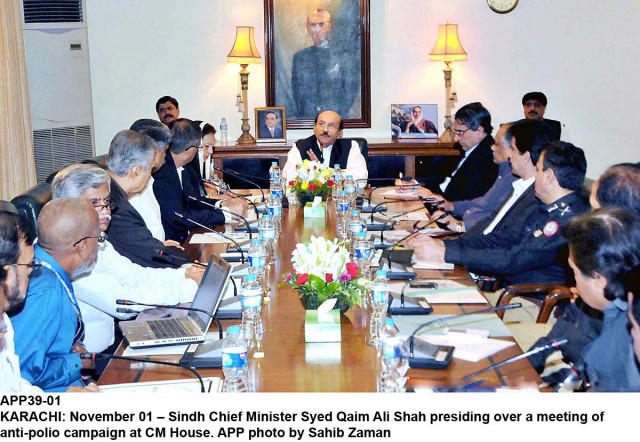Serious this time? Special police force to help special polio teams do their job
CM says he is determined to eliminate the menace of polio from the province by 2015

Serious this time? Special police force to help special polio teams do their job
Sindh Chief Minister Qaim Ali Shah, while expressing concern over the rising incidence of polio cases in Karachi, has decided to constitute a special police force that will accompany vaccination teams to high-risk areas.
The special force, which will be headed by an officer of the SSP rank, will ensure 'foolproof' security to the vaccination teams during the four months of low-transmission period of the virus. The CM directed the Sindh Police Inspector General to deploy an equal number of personnel from Karachi and other districts of the province for the force, which will in turn be given sophisticated weapons and vehicles.
He also directed the health secretary and Karachi commissioner to launch a 'crash programme' in the 11 most-affected union councils of Karachi after Ashura. Pashtun families will also partake in the campaign to make it a success.

Shah made these decisions in a meeting held at CM House on Saturday. The meeting, which was presided over by him, reviewed the anti-polio campaign in the province.
In his address to the participants, the chief minister lamented that despite the government's efforts to eliminate the menace of polio, as many as 23 cases (21 from Karachi and one each from Sanghar and Dadu) had been reported in the current year. "This is terrible news for the government and the people," he stressed.
Subsequently, Shah was informed that of the total cases in the province, 21 were linked to Pashtun families. "These cases are actually being injected into Sindh with the migration of unvaccinated IDPs from the Federally Administered Tribal Areas (Fata)," said the health secretary, Iqbal Durrani. "The Sindh government is getting a bad name through no fault of its own," he remarked. The official was of the view that Fata had become the epicentre of the polio virus and was spreading it to the rest of the country. He added that Sindh was most affected as result, in terms of the spread of the polio virus and terrorists.
"We should regard the polio virus as dangerous as the terrorists," the CM remarked. "We must fight both the menaces simultaneously," he said, directing the officials to use all their resources to achieve the target of making Sindh a polio-free province by the end of 2015.
He asked the officials to overcome their weaknesses and shortfall to stop the spread of the virus once and for all. Shah also directed the Karachi commissioner and health secretary to identify other vulnerable areas which were up till now, not accessible to the vaccination teams.
The identified areas would be cordoned off and a crash programme would be commenced to administer the anti-polio vaccine to the over 107,000 children living in these localities. The CM insisted that the process be repeated again and again for effective results.
The chief minister also stressed the need to monitor the anti-polio campaigns and directed the officials to set up a separate monitoring cell which would perform its functions under the supervision of the additional health secretary. The latter will monitor the activities and identify and rectify the weaknesses so that the threat posed by the virus could be completely eliminated.
Stark warning
The chief minister warned the government officials involved in the anti-polio drive to perform their duties with the utmost diligence and dedication, failing which strict action would be taken against them. "It is a matter of prestige for us," he said. "We are taking it very seriously and will not rest until the virus is completely eliminated from our society."
Security threats
The provincial coordinator for the polio oversight committee, Shahnaz Wazir Ali, in her briefing to the meeting, said that 235 cases had been reported from across Pakistan in the current year. Of these, the largest number had been reported from Fata (151), followed by 48 from Khyber-Pakhtoonkhwa. Of the 23 cases reported in Sindh, 21 were linked to Pashtun families, she said. Ali said that these Pakhtun families were residing in the eleven union councils of Karachi, where anti-polio teams were not only experiencing refusal cases but also facing severe security threats.
Ali was of the opinion that a dedicated security force was needed for 100 per cent coverage in these areas. The coordinator also highlighted financial problems, as according to her, the expenditure made by anti-polio organisations had still not been reimbursed by the federal government. She also requested for more vaccinations to be made available to them by the federal government. "We are now including Pashtun females in the polio teams to cover their residential areas," she said.
The meeting was attended by Sindh chief secretary Sajjad Saleem Hotiyana, Health secretary Iqbal Durani, World Health Organisation representative Dr Salah and Aziz Memon from Rotary Karachi, among others.
Published in The Express Tribune, November 2nd, 2014.



















COMMENTS
Comments are moderated and generally will be posted if they are on-topic and not abusive.
For more information, please see our Comments FAQ